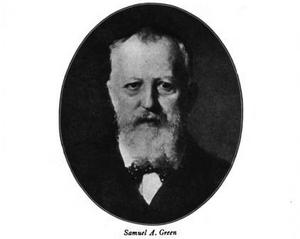Samuel Abbott Green facts for kids
Quick facts for kids
Samuel Abbott Green
|
|
|---|---|
 |
|
| 28th Mayor of Boston, Massachusetts | |
| In office 1882–1882 |
|
| Preceded by | Frederick O. Prince |
| Succeeded by | Albert Palmer |
| Personal details | |
| Born | March 16, 1830 Groton, Massachusetts |
| Died | December 5, 1918 (aged 88) Boston, Massachusetts |
| Profession | physician |
Samuel Abbott Green (born March 16, 1830, died December 5, 1918) was an American doctor who later became a politician. He was a medical officer during the American Civil War. He also served as the mayor of Boston, Massachusetts, in 1882.
Contents
Samuel Abbott Green's Life
Early Life and Education
Samuel Abbott Green was born in Groton, Massachusetts. His parents were Joshua Green and Eliza Lawrence. His grandfather, Samuel Lawrence, was an officer in the American Revolutionary War. His uncles, Amos and Abbott Lawrence, were well-known merchants and politicians.
Green went to the Lawrence Academy at Groton. He graduated in 1847. Then, he went to Harvard and finished in 1851. Three years later, he earned his medical degree from Harvard Medical School. He also studied at Jefferson Medical College. After his studies, he spent several years traveling in Europe.
When he returned to the United States, he started working as a doctor in Boston. He became one of the city's doctors for the public dispensary. On May 19, 1858, Governor Banks appointed him as a surgeon for the 3rd Massachusetts Militia Regiment.
Serving in the Civil War
When the Civil War began, Green became an assistant surgeon. He joined the 1st Massachusetts Volunteer Regiment. He was the first medical officer to sign up for three years of service. On September 2, 1861, he was promoted to surgeon of the 24th Massachusetts Regiment. He stayed with this regiment until November 2, 1864. During this time, he worked with different cavalry officers.
He was in charge of the hospital ship "Recruit" for General Burnside's trip to Roanoke Island. He also commanded the hospital ship "Cosmopolitan" along the coast of South Carolina.
During the Second Battle of Fort Wagner, he was the main medical officer on Morris Island. In October 1863, he was sent to Florida. He worked as a post surgeon in St. Augustine and Jacksonville. From there, he went to Virginia. He was with the army when Bermuda Hundred was taken. He was appointed as an acting staff surgeon. He stayed in Richmond for three months after the city fell. In 1864, he was given the honorary rank of lieutenant colonel of volunteers. This was for his brave and excellent service in the field. In 1862, Green helped create Roanoke Cemetery. This was one of the first official burial places for Union Army soldiers.
After the War
After the Civil War ended, Green continued to serve the public. From 1865 to 1872, he was the superintendent of the Boston Dispensary. He was also a member of the Boston School Board from 1860-1862 and again from 1866-1872. He was a trustee of the Boston Public Library from 1868-1878. He even served as the acting librarian from October 1877 to October 1878.
In 1870, Governor Claflin asked him to join a group that helped disabled soldiers. In 1871, he became the city physician of Boston. He held this job until 1880. In 1878, Congress chose him to be part of a group of experts. Their job was to study yellow fever. In 1882, he was elected mayor of Boston. However, he only served for one term.
A Love for History
Samuel Green spent a lot of time studying history. He was the librarian of the Massachusetts Historical Society from 1868 until he passed away. He also became a member of the American Antiquarian Society in 1865. He served as its vice-president from 1904 to 1918.
Besides many papers on science and history, Green also published several books. Some of his works include:
- My Campaigns in America: a Journal kept by Count William de Deux-Ponts, 1780-'1 (1868) - This was a translation of a French diary.
- An Account of Percival and Ellen Green and of Some of their Descendants (1876) - A private book about his family.
- Epitaphs from the Old Burying-Ground in Groton, Massachusetts (1879) - About old gravestone writings.
- The Early Records of Groton, Mass., 1662-1677 (1880) - About early town records.
- History of Medicine in Massachusetts (1881) - A speech about medical history.
- Groton during the Indian Wars (1883) - About Groton during conflicts.
- Groton during the Witchcraft Times (1883) - About Groton during the witchcraft era.
- The Boundary-Lines of Old Groton (1885) - About the town's old borders.
- The Geography of Groton (1886) - Prepared for the Appalachian Mountain Club.
- "Groton Historical Series" (20 numbers, 1883-1887) - A series of historical writings.
 | Claudette Colvin |
 | Myrlie Evers-Williams |
 | Alberta Odell Jones |

